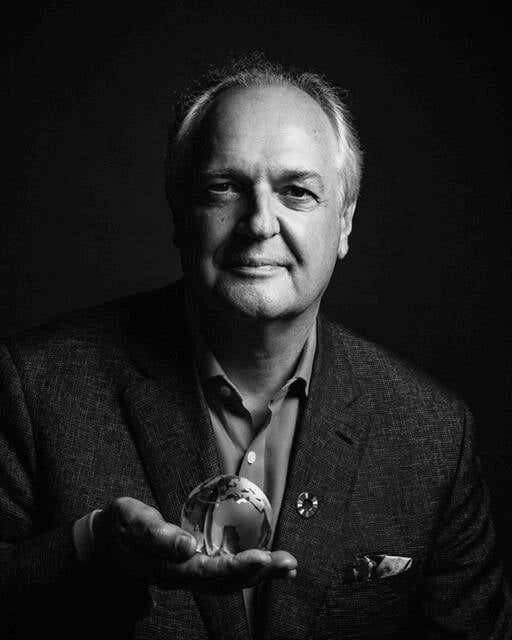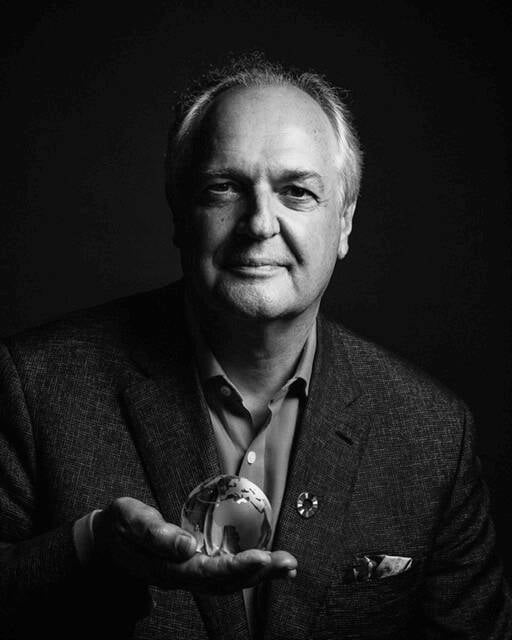What can companies and managers do?
What is enough today may not be tomorrow. It's not so much one thing that you have to do differently as a company, according to Polman, it is more a mindset you need to have. A mindset that, as a company, you want to be net positive. That you want to be part of the solution to the problems we're facing. That you take responsibility. That, as a company, you make a profit because you have a goal, and that goal is to improve the current system. Leadership is a crucial part of that. Every change starts with people. In the end, it's people who make the difference. Leadership is doing things differently than everyone else, and than people have done before you. Leadership is stepping out of the system. It takes guts, but if you have a clear goal in mind, the courage will follow. "The stronger your purpose, the stronger your will to change."
"Models have calculated that restructuring the food system will cost $350 billion. That's a lot of money, but not if you consider the fact that we're saving ourselves and our future from destruction."
What is the solution to the climate crisis?
According to Polman, this is the decade where we have to take a critical look at every choice that's made in our industry. Circularity is no longer enough. It might be enough, if Earth was in balance and we wanted to keep it balanced. But Earth is not in balance. We are in the red. For years, we have been taking more than we are giving back. We steal from future generations every day. So companies that really want to make a difference have to take it a step further than circularity. According to Polman, being net positive is the new sustainability trend, which means that as a company, you're giving back more than you're taking from the planet. Overcompensating, so that Earth can regain its balance, little by little.
It may sound like too much, but according to Polman, it's the only way to save the planet. And in his opinion, there's no such thing as 'too much' when it comes to solving the greatest challenge our planet has ever faced.
Why does the food system need to change?
Polman: "If a group of beings from outer space were to visit our planet and look at our food system – what we eat, where and how we produce our food, and the impact of our diet on our bodies and on the planet, they would think we are the most unintelligent species in the universe. Our food system is responsible for 25% of the total amount of greenhouse gases, which contributes to the climate crisis. We are exploiting farmers. We waste 30% of all the food we produce. Even though 9% of the world's population goes hungry every day, nearly 50% of people in Western countries are overweight. 60% of our healthcare costs are related to diseases of affluence. We're literally eating ourselves sick."
"65% of the world economy is generated by companies, companies account for 80% of all financial traffic, and 90% of employment. So if companies don't lead the way, it will be very difficult for others to get things moving on such a huge scale."
Why should companies be the frontrunners?
According to Polman, companies should take the lead in sustainability, not the government, and not the consumer. After all, companies have speed and agility that the government doesn't, and a scale that consumers can't achieve. Governments are also still border-oriented, and even if they do look beyond borders, they’ll always operate from a specific national or regional perspective. But climate change, pandemics, and crises don't respect borders. Companies, and multinationals in particular, are much more global than governments, which means they are better equipped to approach these kinds of global issues. In certain ways, companies can even transcend world politics. For instance, in the LGBT discussion – governments may disagree on the LGBT rights, but companies can take positions and demonstrate their support for the community with things like rainbow flags and campaigns.
about Paul Polman
Paul Polman is the former CEO of Unilever. He is a champion of sustainability. Under his leadership, Unilever introduced the Sustainable Living Plan (SLP) in November 2010. With that plan, Unilever aims to double turnover while simultaneously reducing their environmental footprint. Polman is the chair of the International Business Council at the World Economic Forum and the World Business Council for Sustainable Development.
Circularity is no longer enough, we have to find ways to be net positive
Maaike de Reuver Xiao Er Kong
Former Unilever CEO Paul Polman is a strong advocate of sustainability. He argues that companies and managers need to work up the courage to break with current systems and look beyond borders for new ways to run and manage a business. He believes that net positive operating results are the ultimate goal – that as a company, you give back to the planet more than you take in.


"Companies and managers must pave the way for sustainability, not governments or consumers"
interview
4 min
Companies and managers must pave the way for sustainability, not governments or consumers

What can companies and managers do?
What is enough today may not be tomorrow. It's not so much one thing that you have to do differently as a company, according to Polman, it is more a mindset you need to have. A mindset that, as a company, you want to be net positive. That you want to be part of the solution to the problems we're facing. That you take responsibility. That, as a company, you make a profit because you have a goal, and that goal is to improve the current system. Leadership is a crucial part of that. Every change starts with people. In the end, it's people who make the difference. Leadership is doing things differently than everyone else, and than people have done before you. Leadership is stepping out of the system. It takes guts, but if you have a clear goal in mind, the courage will follow. "The stronger your purpose, the stronger your will to change."

"Models have calculated that restructuring the food system will cost $350 billion. That's a lot of money, but not if you consider the fact that we're saving ourselves and our future from destruction."
What is the solution to the climate crisis?
According to Polman, this is the decade where we have to take a critical look at every choice that's made in our industry. Circularity is no longer enough. It might be enough, if Earth was in balance and we wanted to keep it balanced. But Earth is not in balance. We are in the red. For years, we have been taking more than we are giving back. We steal from future generations every day. So companies that really want to make a difference have to take it a step further than circularity. According to Polman, being net positive is the new sustainability trend, which means that as a company, you're giving back more than you're taking from the planet. Overcompensating, so that Earth can regain its balance, little by little.
It may sound like too much, but according to Polman, it's the only way to save the planet. And in his opinion, there's no such thing as 'too much' when it comes to solving the greatest challenge our planet has ever faced.
Why does the food system need to change?
Polman: "If a group of beings from outer space were to visit our planet and look at our food system – what we eat, where and how we produce our food, and the impact of our diet on our bodies and on the planet, they would think we are the most unintelligent species in the universe. Our food system is responsible for 25% of the total amount of greenhouse gases, which contributes to the climate crisis. We are exploiting farmers. We waste 30% of all the food we produce. Even though 9% of the world's population goes hungry every day, nearly 50% of people in Western countries are overweight. 60% of our healthcare costs are related to diseases of affluence. We're literally eating ourselves sick."
"65% of the world economy is generated by companies, companies account for 80% of all financial traffic, and 90% of employment. So if companies don't lead the way, it will be very difficult for others to get things moving on such a huge scale."

Why should companies be the frontrunners?
According to Polman, companies should take the lead in sustainability, not the government, and not the consumer. After all, companies have speed and agility that the government doesn't, and a scale that consumers can't achieve. Governments are also still border-oriented, and even if they do look beyond borders, they’ll always operate from a specific national or regional perspective. But climate change, pandemics, and crises don't respect borders. Companies, and multinationals in particular, are much more global than governments, which means they are better equipped to approach these kinds of global issues. In certain ways, companies can even transcend world politics. For instance, in the LGBT discussion – governments may disagree on the LGBT rights, but companies can take positions and demonstrate their support for the community with things like rainbow flags and campaigns.
about Paul Polman
Paul Polman is the former CEO of Unilever. He is a champion of sustainability. Under his leadership, Unilever introduced the Sustainable Living Plan (SLP) in November 2010. With that plan, Unilever aims to double turnover while simultaneously reducing their environmental footprint. Polman is the chair of the International Business Council at the World Economic Forum and the World Business Council for Sustainable Development.
Maaike de Reuver Xiao Er Kong
Former Unilever CEO Paul Polman is a strong advocate of sustainability. He argues that companies and managers need to work up the courage to break with current systems and look beyond borders for new ways to run and manage a business. He believes that net positive operating results are the ultimate goal – that as a company, you give back to the planet more than you take in.
Circularity is no longer enough, we have to find ways to be net positive
"Companies and managers must pave the way for sustainability, not governments or consumers"
4 min











